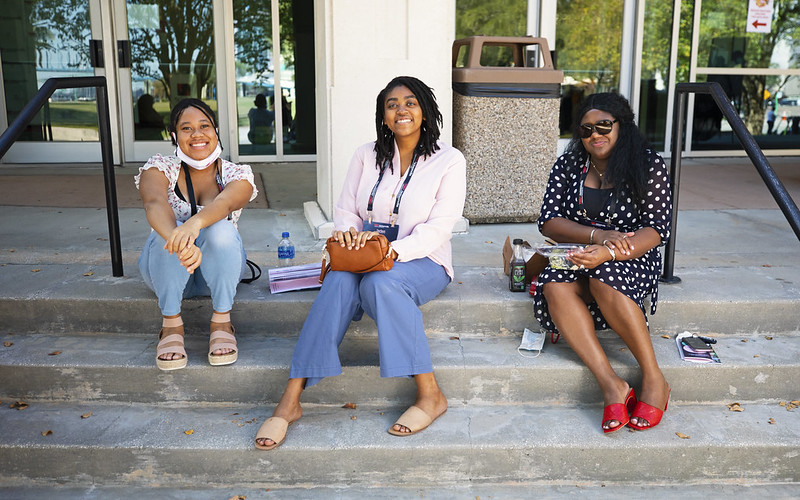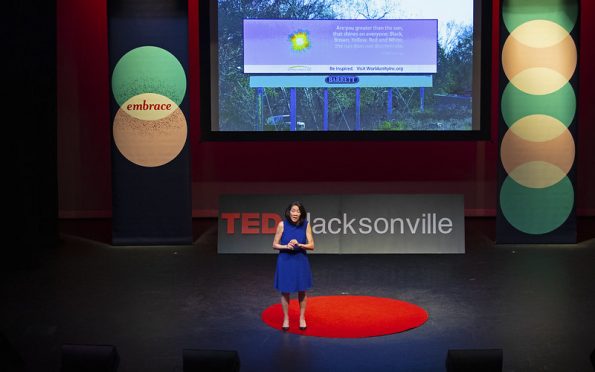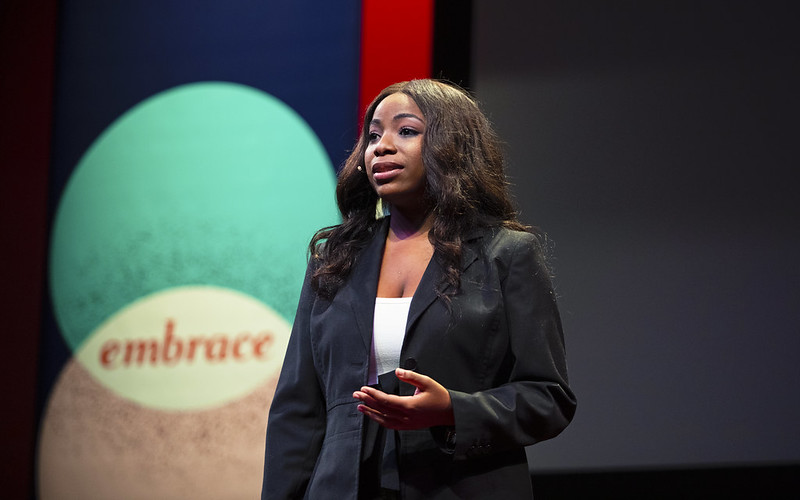“Are you greater than the sun
That shines on everyone:
Black, Brown, Yellow, Red and White,
The sun does not discriminate.”
When Sara Ting wrote those four lines in 1978, she could have never imagined that in 1985 her “Sun Poem” would appear on buses, trains, and billboards as the centerpiece of a public service campaign to promote racial and ethnic harmony in Boston. She also could have never imagined the profound impact she and the poem would have on a customer service representative from Florida 43 years later.
Joanne Boatright had spent two years taking customer calls for a very large insurance company when she was forwarded a call from Sara last August.
The founder and president of World Unity, Inc., a nonprofit working to eliminate all forms of racial, ethnic, religious. and cultural bigotry, prejudices, discrimination, and biases, told Joanne she wanted to speak with the Executive Office. She was calling to praise the company for signing the pledge “CEOs Act on Diversity and Inclusion” and ask if they would consider being a sponsor of her organization.
During the call, Sara explained to Joanne how her nonprofit used poetry and the arts to promote diversity, equity and inclusion.
“She was very attentive, and by the end of the conversation, I said ‘Promise me that you’re going to tell your boss that you did an excellent job listening with an open mind and open heart,’” Sara says.
But Joanne didn’t feel comfortable doing that.
“I told her I was just doing my job to handle her request to the best of my ability, and I couldn’t take the time out of my schedule to advise my supervisor of such a thing,” Joanne says. “I explained that I was being timed on every call, including ours.”
Sara told Joanne that she shouldn’t be working for a company that doesn’t value her.
“That struck a chord, because I felt like I was one of many. I felt that I didn’t make a difference,” Joanne says.
After 30 minutes, Joanne gave Sara the name of the president of the company’s U.S. headquarters and suggested she email him. Sara left Joanne her phone number and suggested she look her up on LinkedIn.
After hanging up, Joanne reflected on Sara’s words. “Before speaking with Sara I had been praying for a sign as to when I should leave this high-stress job that had me on anxiety medication,” Joanne says. “She was the sign I was looking for. She said ‘You’re invisible. You should find somewhere that will treasure what you have to offer.’“

Joanne emailed a letter of resignation to her managers and called her supervisor to let her know she was quitting that same day. Then she went online to look Sara up and found the “Sun Poem.” “When I read the poem, I remember saying ‘It’s going to be okay.’ The poem reassured me that I was on the right track for myself, and no one had dominion over me but me.” Joanne says.
Many people in her life had told Joanne repeatedly to quit her job. But she was going through a divorce and needed a way to support herself. “Sara’s call pushed me over the edge and then reading the poem got rid of the anxiety and panic of quitting my job. I felt like I could accomplish anything” Joanne says. “I felt like I’d just walked out into sunshine, like a burden had been lifted.” Later that day, Joanne called Sara and left a voicemail letting her know she had resigned.
When the two women connected later that week, they spent three hours on the phone.“She let me know what was going on in her life. She told me about her job search. She told me how she read the poem nine times to reflect on it,” Sara says.
“We just bonded over so many things. It’s as if I’d reconnected with a long-lost best friend,” Joanne says. “I knew she wanted to share so much with me, and the feeling was mutual.”
Sara and Joanne spoke on the phone several times over the summer. Sara had shared that she was going to speak at the TEDx Jacksonville conference and even rehearsed her talk with Joanne listening in.
Two weeks before the October 23rd event, Sara’s sister let her know she would be unable to fly down to Florida for the conference.
Sara knew Joanne lived in Florida and called to offer her the ticket. “I wanted to give her something to feed her soul,” Sara says.
“I didn’t have a clue who was speaking besides Sara. But it wasn’t so much about the TEDx event, as it was about being able to support her,” Joanne says.

What Joanne didn’t know was that speaking at TEDx had been a dream of Sara’s for many years. And for Joanne it was a chance to feel empowered as she embarked on a new chapter in her life.

“I thought the speakers were fantastic. There was the young lady, Delaney Liskey, who has cerebral palsy. What she talked about really impacted me,” Joanne says.
She was also moved by Deyona Burton, who spoke about her and her classmates crusade to change the name their school from Robert E. Lee Senior High School to Riverside High School.
“Even as a black woman, I didn’t fully grasp how important this issue was, but hearing her speak I understood that we have to have a foot in the race to get things done, that you can’t just sit on the sidelines,” Joanne says.
While the speakers left Joanne wanting more, the highlight of the conference was getting to meet Sara in person. “I walked up to her, and she hugged me. It felt like she was family. I knew that she had my best interests at heart,” says Joanne who drove more than two hours to attend the conference.
Sara was equally excited. “I felt a sense of joy getting to meet her after having had such an impact on her life,” Sara says. “That poem I wrote in 1978 was never meant to be public, but realizing that it could empower others like Joanne was extremely powerful.”
“It’s such a great way to be encouraged and inspired and this is what the event did for me. I’m just working on getting to know myself better. Thanks to Sara, I’m trying to figure out what do I want to do, who do I want to be, and what do I want to leave behind,” Joanne says. “Thanks to Sara and TEDx, being a mom and working for 30 years in the health care industry won’t be my only legacy. I want something more and I’m giving myself the space to figure out what that is.”


